This article was medically reviewed by Shari Forschen, NP, MA. Shari Forschen is a Registered Nurse at Sanford Health in North Dakota. Shari has worked in healthcare since 1996 and her expertise lies in acute care bedside nursing on a medical oncology floor. She received her degree from Medcenter one College of Nursing in 2003 and her Family Nurse Practitioner Masters from the University of North Dakota in 2014. Shari is a member of the American Nurses Association.
There are 15 references cited in this article, which can be found at the bottom of the page.
wikiHow marks an article as reader-approved once it receives enough positive feedback. This article received 13 testimonials and 99% of readers who voted found it helpful, earning it our reader-approved status.
This article has been viewed 1,014,564 times.
Experts agree that donating blood is safe and straightforward. Most people who are over sixteen, over 110 pounds, and generally healthy can donate without any major issues.[1] . Organizations like the Red Cross recommend eating a healthy meal and drinking plenty of water before your donation.[2] If you follow the simple steps in this article, you will be fully prepared for your blood donation.
Steps
Getting Ready to Donate
-
1Determine if you are eligible. Each country's blood service has different requirements in place to be eligible to donate blood. These can range from blood disease concerns, to past travel locations, to age and weight. In general, you will be able to give blood if you meet certain criteria.
- Check out the Mayo Clinic's comprehensive guide to blood donation[3]
- You have to be healthy, fit, and not suffering from a current illness. Avoid donating blood if you have a cold, a cold sore, a cough, a virus, or an upset stomach. Certain prescribed medications, such as antibiotics, can make you ineligible to donate blood.
- You must weigh at least 110 pounds or 50 kg.
- You have to be old enough. In many jurisdictions, parental permission is required for the ages 16–17 to give blood. Check the blood organization in your area if you are around this age.
- You can only donate blood every 56 days if you are male, and 84 if you are female (to ensure iron levels are high enough after menstrual cycles). If you have donated blood more recently than that, then you are not eligible again, until that period is over.[4]
- Do not give blood if you have had simple dental work done within 24 hours or major dental work in the past month.[5] Dental work in general can place one at risk for dislodging bacteria. This bacteria can get into the blood stream and cause systemic infection.
- Wait 6-12 months to give blood after getting any new body piercings or tattoos.[6]
-
2Make an appointment. There are many blood donation centers across many countries. Since these centers need time to prepare for you to give blood, you should make an appointment. This also gives you time to ensure all the eligibility requirements are met for that particular date.[7]
- You can also look for a blood drive if you don't want to make an appointment. Check local advertisements for blood drives in your area.
Advertisement -
3Eat iron-rich foods. Since blood production requires iron, you should eat iron-rich foods for two weeks before your appointment. This will help you have strong blood for donation and help you better recuperate after your donation. Iron-rich foods include spinach, whole grains, fish, poultry, beans, meats such as liver, eggs, and beef.[8] [9]
- Having good levels of vitamin C will also help to increase iron absorption. Try to consume citrus fruit, juices, or vitamin C supplements.
-
4Hydrate yourself. To prepare your body for the loss of blood, you need to drink plenty of water or fruit juice the night and morning before you donate. The leading cause of faintness and dizziness when you give blood is a drop in blood pressure or blood sugar. The risk of this is greatly reduced if you are well-hydrated when you visit the donation center.[10]
- It is recommended you drink a lot in the 24 hours leading to the donation time, especially when it's warm. This includes drinking four good sized glasses of water or juice during the three hours leading up to your donation.[11]
- If you are donating plasma or platelets, drink four to six 8-ounce glasses of fluids two to three hours before your appointment.[12]
- Being well-hydrated will also make it easier for the nurse to find your vein.
-
5Get a good night's rest. Before you donate blood, you should have an appropriate amount of sleep. This will help you feel better and more alert when you give blood, which will help reduce the risk of any adverse reactions to the process.[13]
- This means you should get a full night's sleep (7-9 hours for adults)[14] before you donate blood.
-
6Eat 1-3 hours before your donation. Never give blood if you have not eaten that day. Eating will keep your blood sugar levels stable, which will help you feel better after you have donated blood. Having food in your system helps to ward off lightheadedness and fainting. You should eat something healthy that fills you up but doesn't make you feel uncomfortably full.
- If you are donating early, eat something like eggs and toast, or something else to increase your iron levels, salt levels, and water levels. If you are giving blood near the middle of the day, have lunch, such as a sandwich and piece of fruit. Don't be too full, but make sure you eat enough to keep your blood pressure high enough for donation.
- Don't eat immediately before your appointment to lessen the risk of being nauseated during your donation.
- Avoid fatty foods for 24 hours before you donate. Increased fat in your blood stream might make it impossible to get accurate readings on mandatory screening tests conducted on your blood after you donate. If the center can't run all the tests, they may have to discard your donation.
-
7Present the proper ID cards. The requirements for each blood donation center may differ, but you will always need at least one form of ID for your visit. This generally includes your driver's license, your blood donor card, or two alternate forms of ID, such as your passport and social security card. Make sure you take these on the day of your appointment.[15]
- A blood donor card is a card you get from the blood donation center that registers you within their system. You can order one of these online, go by the center to order one, or ask about them when you donate the first time, so you have one for subsequent donation visits.[16]
-
8Avoid certain activities. In the hours leading up to your appointment, you need to avoid certain activities that may hurt your chances of donating or contaminate your blood. You should not smoke during the hour leading up to your appointment. You should also avoid alcoholic beverages 24 hours before you donating.
- Chewing gum or candy makes the temperature in your mouth go up, which could make it seem like you have a fever and make you ineligible to give blood, these effects wear off in five minutes.[17]
- If you are giving platelets, you should avoid taking aspirin, ibuprofen, or other NSAIDs for two days before you donate.
Donating Your Blood
-
1Fill out the forms. When you arrive at your appointment, you will first have to answer many questions about your general health and likely fill out a confidential medical history form. The types of questions you will be asked vary depending on your particular location, but you should be ready to at least name any medications that you currently take and any locations you have traveled to in the past 3 years.
- The United Blood Services is regulated by US Food and Drug Administration. They must comply with regulations set forth by the FDA. FDA guidelines have the safety of the public in mind and if any behavior, disease, or medication is deemed risky for potential contamination or transmission of disease, one is asked not to donate. It is not meant to discriminate.
- As such, certain activities increase the chances of blood borne illnesses and will be inquired about. These include intravenous drug use, certain sexual activities, taking certain medications, and living in certain countries. If you answer yes to any of these questions, you may not be able to give blood.
- There are also certain diseases, such as hepatitis, HIV, AIDS, and Chagas' disease, that will make it impossible for you to ever donate blood.
- Answer all interview questions honestly. They may delve into sensitive topics, but you should be honest so the center will have an idea if they can use your blood.[18]
-
2Take the physical. Once you pass all the portions of the questionnaire, you will be given a small physical. This typically includes a nurse taking your blood pressure, checking your pulse, and measuring your body temperature. The nurse will then give you a small prick on your finger in order to check your hemoglobin and iron levels.
- Your blood pressure, pulse, temperature, hemoglobin levels, and iron levels need to be within the healthy range before you can give blood. This ensures the health of your blood and that you aren't anemic after donating.[19]
-
3Prepare yourself mentally. Many people who give blood are afraid of needles or don't like to be stuck with one. You can distract or prepare yourself before it happens to make it easier on you. Look away from the needle and take deep breaths before the needle goes in. You can also pinch yourself with the arm not giving blood to create a distraction.
- Don't hold your breath. If you do, you might pass out.
- Be reassured that most people report little or no pain, mostly just feeling a pinch. The real issue is discomfort, so the less you tense up, the better.[20]
-
4Have your blood taken. When you finish your physical, the nurse will ask you to lie back in a reclining chair or lie down all the way. A cuff will be placed around your arm to make your veins easier to see and your blood pump faster. The nurse will clean the inside of your elbow, which is where the needle will be placed. The nurse will then place the needle in your arm, which is attached to a long tube. The nurse will ask you to pump your hand a few times and your blood will start coming out.
- The nurse will take a few vials of blood first for testing, then your blood will fill the bag. You usually give a pint of blood at a time.
- This process typically takes between 10–15 minutes.[21]
-
5Relax. Nervousness can also cause your blood pressure to drop and can lead to dizziness. Talk to the person taking your blood if it helps you feel better. Ask them to explain everything that is being done.
- Find ways to distract yourself, such as singing a song, reciting something, contemplating the outcome of a book you're reading or a TV series you follow, listening to your electronic device, or thinking about the worthy end result of your donation.
-
6Rest and replenish. Once you are finished giving blood and the nurse bandages your arm up, you will be asked to sit and wait for about 15 minutes to ensure that you don't faint or feel dizzy. You will also get a snack and some juice to help replenish your fluids and up your blood sugar. The nurse will also suggest that you avoid certain things for the rest of the day and replenish your fluids for the next 48 hours.
- You should not do any heavy lifting or strenuous activity such intense exercise for the rest of the day.
- If you feel lightheaded later in the day, lie down with your feet elevated.
- Leave the bandage on for four to five hours after your donation. If it bruises badly, apply a cold compress. If it hurts, take an over-the-counter pain medication to relieve it.[22]
- If you feel ill for long periods of time after your visit, call your doctor to make sure everything is okay.
Expert Q&A
-
QuestionDoes the cuff stay tightly around your arm throughout the whole procedure?
 Shari Forschen, NP, MAShari Forschen is a Registered Nurse at Sanford Health in North Dakota. Shari has worked in healthcare since 1996 and her expertise lies in acute care bedside nursing on a medical oncology floor. She received her degree from Medcenter one College of Nursing in 2003 and her Family Nurse Practitioner Masters from the University of North Dakota in 2014. Shari is a member of the American Nurses Association.
Shari Forschen, NP, MAShari Forschen is a Registered Nurse at Sanford Health in North Dakota. Shari has worked in healthcare since 1996 and her expertise lies in acute care bedside nursing on a medical oncology floor. She received her degree from Medcenter one College of Nursing in 2003 and her Family Nurse Practitioner Masters from the University of North Dakota in 2014. Shari is a member of the American Nurses Association.
Master's Degree, Nursing, University of North Dakota No, it does not stay tight throughout whole procedure, only at the beginning to obtain intravenous access.
No, it does not stay tight throughout whole procedure, only at the beginning to obtain intravenous access. -
QuestionIs it wrong to have sex before donating blood?
 Shari Forschen, NP, MAShari Forschen is a Registered Nurse at Sanford Health in North Dakota. Shari has worked in healthcare since 1996 and her expertise lies in acute care bedside nursing on a medical oncology floor. She received her degree from Medcenter one College of Nursing in 2003 and her Family Nurse Practitioner Masters from the University of North Dakota in 2014. Shari is a member of the American Nurses Association.
Shari Forschen, NP, MAShari Forschen is a Registered Nurse at Sanford Health in North Dakota. Shari has worked in healthcare since 1996 and her expertise lies in acute care bedside nursing on a medical oncology floor. She received her degree from Medcenter one College of Nursing in 2003 and her Family Nurse Practitioner Masters from the University of North Dakota in 2014. Shari is a member of the American Nurses Association.
Master's Degree, Nursing, University of North Dakota Yes, if it is unprotected sex with someone in a high-risk group, such as with sex worker, anal sex, etc.
Yes, if it is unprotected sex with someone in a high-risk group, such as with sex worker, anal sex, etc.
References
- ↑ https://www.nhlbi.nih.gov/health-topics/blood-donation
- ↑ https://www.redcrossblood.org/donate-blood/blood-donation-process/before-during-after.html
- ↑ http://www.mayoclinic.org/tests-procedures/blood-donation/basics/how-you-prepare/prc-20020069
- ↑ http://www.redcrossblood.org/donating-blood/eligibility-requirements
- ↑ http://www.nzblood.co.nz/?t=41
- ↑ https://www.redcrossblood.org/donating-blood/eligibility-requirements/eligibility-criteria-topic
- ↑ http://www.redcrossblood.org/m/getting-ready
- ↑ http://www.redcrossblood.org/m/getting-ready
- ↑ http://www.redcrossblood.org/donating-blood/tips-successful-donation
- ↑ http://www.nzblood.co.nz/?t=50
- ↑ http://www.donateblood.com.au/learn/before-and-after-you-donate
- ↑ http://www.cslplasma.com/become-a-donor/donation-success
- ↑ http://www.redcrossblood.org/donating-blood/tips-successful-donation
- ↑ https://sleepfoundation.org/how-sleep-works/how-much-sleep-do-we-really-need
- ↑ http://www.redcrossblood.org/m/getting-ready
- ↑ http://www.redcrossblood.org/forms/order-blood-donor-card
- ↑ https://www.ncbi.nlm.nih.gov/pubmed/11606822
- ↑ http://www.mayoclinic.org/tests-procedures/blood-donation/basics/what-you-can-expect/prc-20020069
- ↑ http://www.mayoclinic.org/tests-procedures/blood-donation/basics/what-you-can-expect/prc-20020069
- ↑ http://www.mayoclinic.org/tests-procedures/blood-donation/basics/what-you-can-expect/prc-20020069
- ↑ http://www.mayoclinic.org/tests-procedures/blood-donation/basics/what-you-can-expect/prc-20020069
- ↑ http://www.mayoclinic.org/tests-procedures/blood-donation/basics/what-you-can-expect/prc-20020069
About This Article
To prepare to donate blood, eat a snack and drink about 3 glasses of water before you go in so you don't feel faint. You should also be ready to fill out some forms, take a physical exam, and show identification before your blood is drawn. If you are afraid of needles, take deep breaths and look away from the needle. In the 2 weeks before you donate, make sure to stay hydrated and eat iron-rich foods, like eggs, spinach, beef, and whole grains. For tips from our Nurse reviewer on how to replenish your body after you donate blood, read on!









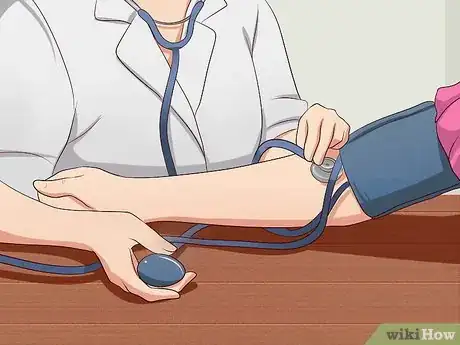

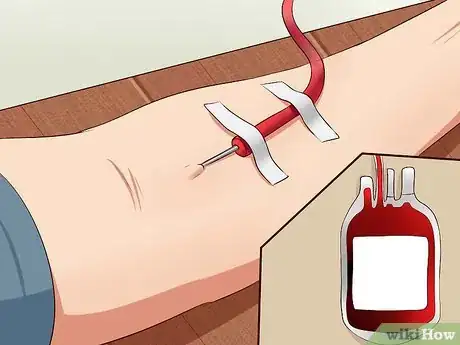








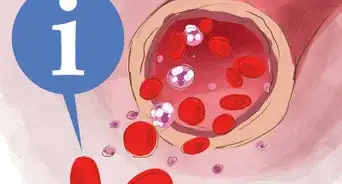
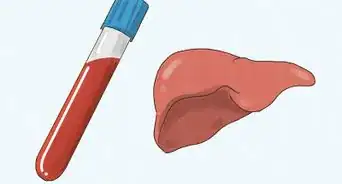

-Step-14-Version-2.webp)
















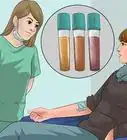






































Medical Disclaimer
The content of this article is not intended to be a substitute for professional medical advice, examination, diagnosis, or treatment. You should always contact your doctor or other qualified healthcare professional before starting, changing, or stopping any kind of health treatment.
Read More...